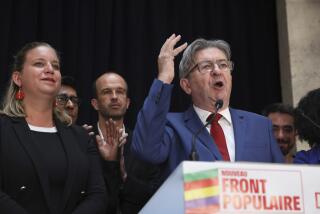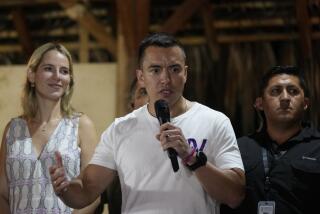Colombia Vote Gives Liberals Leading Role
BOGOTA, Colombia — Results compiled Monday from Colombia’s congressional elections gave the traditional Liberal Party and its candidate for president, Virgilio Barco, 66, an imposing edge in the presidential election May 25.
Marxist guerrillas, who competed openly in a Colombian election for the first time, emerged with only a tiny share of Sunday’s congressional vote but substantially increased the leftist presence in both houses of Congress.
The results dealt serious setbacks to Barco’s rival presidential contenders from the governing Conservative Party and from the New Liberalism movement, a renegade faction of the Liberal Party.
‘Renovating Ideals’
The main-line Liberals’ 48% share of the vote was greater than the combined shares of the Conservatives and New Liberalism, putting Barco in the favored position for the May presidential contest.
With more than 85% of the polling places tallied Monday evening, the Liberal Party had 48.7% of the votes for the Senate. Results for the Chamber of Representatives were similar.
The Conservatives had 37.4% of the votes for the Senate, while New Liberalism trailed with 6.9%. The guerrilla-sponsored Patriotic Union had 1.5%.
The remaining votes went to combined party tickets in a few provincial races and to a scattering of smaller parties.
According to unofficial projections, the Liberal Party increased its representation in the 114-member Senate from 55 to 60, gaining a majority, and apparently retained its majority in the 199-member chamber.
The projections may change because of close races in which all votes have not been tabulated. No projections were available on simultaneous elections for provincial assemblies and municipal councils.
Bogota’s RCN radio network said Monday evening that its projections gave the guerrilla-led Patriotic Union, which includes the Communist Party of Colombia, three seats in the Senate and seven in the chamber. In 1982 elections, a Communist-led coalition won one seat in each house.
The Revolutionary Armed Forces of Colombia, the country’s largest guerrilla group, formed the Patriotic Union last year under a peace agreement with the government of Conservative President Belisario Betancur. Two smaller guerrilla factions also joined the “peace process.”
Other armed rebels, including the April 19 Movement and the People’s Liberation Army, continue to fight the government.
Sunday night, a unit of the People’s Liberation Army killed nine policemen who were guarding the local voting registrar at Pueblo Nuevo, about 250 miles from Bogota in northern Cordoba province, authorities reported Monday. The guerrillas abducted the registrar and stole ballots from Sunday’s voting.
Colombia, with a population of 29 million, has one of Latin America’s best records of democratic government. It has been governed by elected civilians from the Liberal or Conservative parties for most of the 20th Century.
Results in 1982
In 1982 presidential elections, Conservative Betancur won with 46.8% of the vote. The Liberal Party candidate, former President Alfonso Lopez Michelsen, took 41.1% and New Liberalism candidate Luis Carlos Galan 10.9%.
Some political analysts say that if Galan had not split the Liberal vote then, Lopez Michelsen would have defeated Betancur. Galan, 43, is running again this year, but after Sunday’s vote he seems less likely to play a major role in the presidential contest.
Betancur is barred by the constitution from seeking immediate re-election. This year’s Conservative candidate is Alvaro Gomez, 66, a veteran politician and journalist who ran for the presidency in 1974 and lost.
Barco, an engineering graduate of the Massachusetts Institute of Technology, entered politics soon after returning from the American university.
He has been a Bogota city councilman and mayor, a member of both houses of Congress, and minister of public works, finance and agriculture. From 1976 to 1980, he was the Colombian ambassador to the United States.
More to Read
Sign up for Essential California
The most important California stories and recommendations in your inbox every morning.
You may occasionally receive promotional content from the Los Angeles Times.










